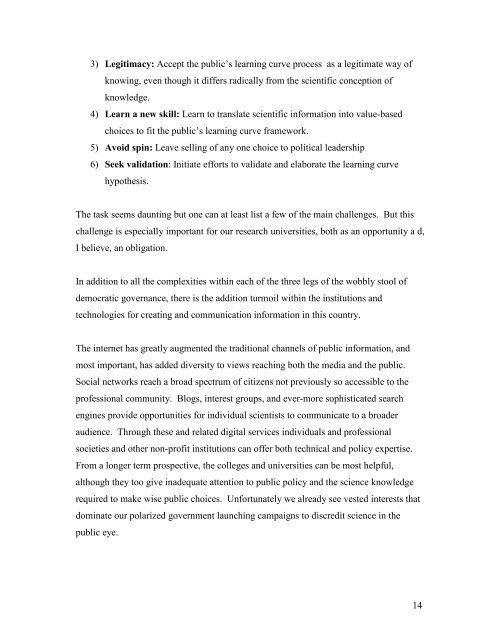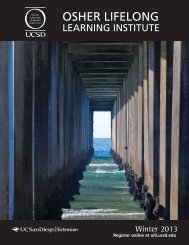1 The Wobbly Three-Legged Stool: Science, Politics, and the Public ...
1 The Wobbly Three-Legged Stool: Science, Politics, and the Public ...
1 The Wobbly Three-Legged Stool: Science, Politics, and the Public ...
Create successful ePaper yourself
Turn your PDF publications into a flip-book with our unique Google optimized e-Paper software.
3) Legitimacy: Accept <strong>the</strong> public’s learning curve process as a legitimate way of<br />
knowing, even though it differs radically from <strong>the</strong> scientific conception of<br />
knowledge.<br />
4) Learn a new skill: Learn to translate scientific information into value-based<br />
choices to fit <strong>the</strong> public’s learning curve framework.<br />
5) Avoid spin: Leave selling of any one choice to political leadership<br />
6) Seek validation: Initiate efforts to validate <strong>and</strong> elaborate <strong>the</strong> learning curve<br />
hypo<strong>the</strong>sis.<br />
<strong>The</strong> task seems daunting but one can at least list a few of <strong>the</strong> main challenges. But this<br />
challenge is especially important for our research universities, both as an opportunity a d,<br />
I believe, an obligation.<br />
In addition to all <strong>the</strong> complexities within each of <strong>the</strong> three legs of <strong>the</strong> wobbly stool of<br />
democratic governance, <strong>the</strong>re is <strong>the</strong> addition turmoil within <strong>the</strong> institutions <strong>and</strong><br />
technologies for creating <strong>and</strong> communication information in this country.<br />
<strong>The</strong> internet has greatly augmented <strong>the</strong> traditional channels of public information, <strong>and</strong><br />
most important, has added diversity to views reaching both <strong>the</strong> media <strong>and</strong> <strong>the</strong> public.<br />
Social networks reach a broad spectrum of citizens not previously so accessible to <strong>the</strong><br />
professional community. Blogs, interest groups, <strong>and</strong> ever-more sophisticated search<br />
engines provide opportunities for individual scientists to communicate to a broader<br />
audience. Through <strong>the</strong>se <strong>and</strong> related digital services individuals <strong>and</strong> professional<br />
societies <strong>and</strong> o<strong>the</strong>r non-profit institutions can offer both technical <strong>and</strong> policy expertise.<br />
From a longer term prospective, <strong>the</strong> colleges <strong>and</strong> universities can be most helpful,<br />
although <strong>the</strong>y too give inadequate attention to public policy <strong>and</strong> <strong>the</strong> science knowledge<br />
required to make wise public choices. Unfortunately we already see vested interests that<br />
dominate our polarized government launching campaigns to discredit science in <strong>the</strong><br />
public eye.<br />
14









